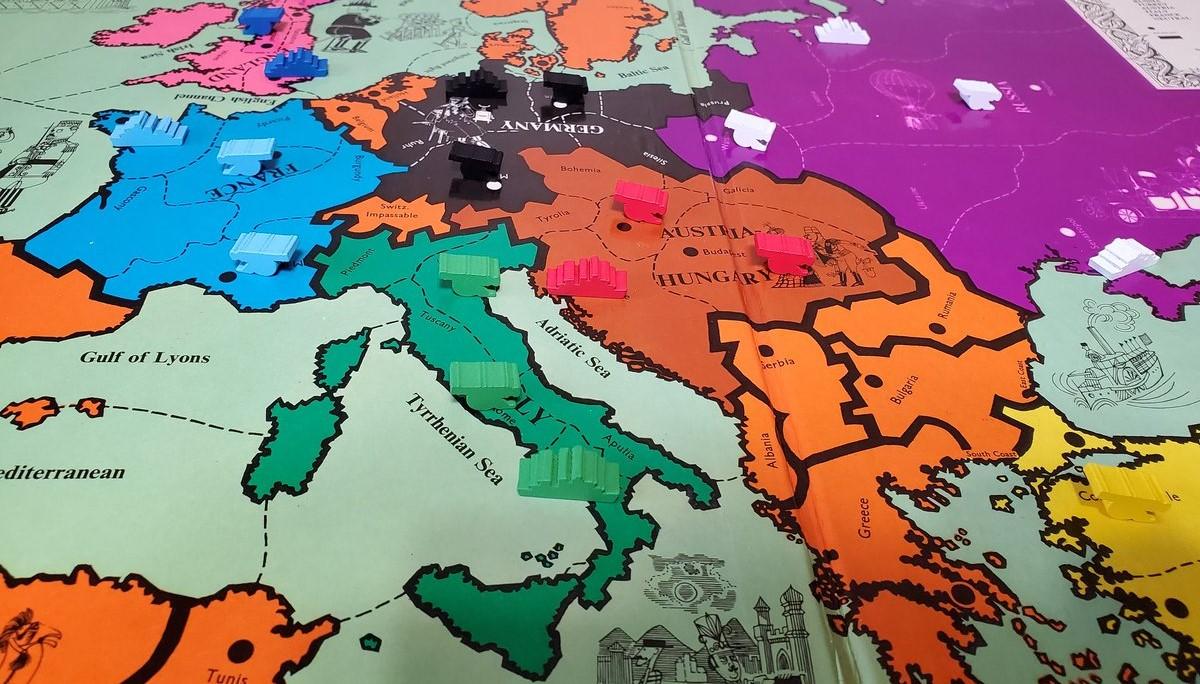Board Game Mechanics – Alliance
The alliance mechanic in board games is a game element that allows players to form temporary partnerships or alliances with one another. The main objective of the alliance is to work together towards a common goal or to gain an advantage over other players. This mechanic is often used in games where player elimination is a possibility or in games that require players to work together to defeat a common enemy.
During an alliance, players may agree to share resources, trade items, or help each other in combat. However, these alliances are not permanent and can be broken at any time. Players may decide to break an alliance when it no longer benefits them or when they feel that they can gain an advantage by turning on their former ally.
Alliances can be formed in many different ways, such as through negotiations, card effects, or by a game’s rules. Some games have specific rules that govern how alliances are formed and how they can be broken.
An example of a game with an alliance mechanic is Diplomacy. In Diplomacy, players represent different European powers during the early 20th century and must work together to gain control of key territories. Players can negotiate with each other and form alliances, but these alliances can be broken at any time, leading to shifting alliances and betrayals.
- Diplomacy – A game of negotiation and strategy set in Europe just prior to World War I. Players represent different nations, forming and breaking alliances in order to gain control over territories.
- Twilight Imperium – A massive sci-fi board game where players take on the roles of different space-faring factions. Players can form alliances to help each other achieve objectives or conquer opponents.
- Axis and Allies – A classic World War II-themed game where players take on the roles of different countries. Players can form alliances to coordinate their strategies and pool resources.
- Game of Thrones: The Board Game – Based on the popular book and television series, this game involves players vying for control of different regions of Westeros. Players can form alliances with other players or use subterfuge to undermine their opponents.
- Eclipse – A space-themed game where players explore the galaxy, build ships and battle other players. Players can form alliances to protect themselves or work together to conquer a common enemy.
- Cosmic Encounter – A sci-fi game where players each control a unique alien species. Players can form alliances with each other to help each other achieve objectives or betray each other for personal gain.
- Scythe – A game set in an alternate history where players represent different factions vying for control over a post-World War I Europe. Players can form alliances to help each other or backstab each other to gain the upper hand.
- Dead of Winter – A zombie survival game where players work together to survive against the undead hordes. Players can form alliances to share resources or go their own way to achieve personal objectives.
- Risk – A classic game of world domination where players control armies and try to take over the world. Players can form alliances to conquer opponents or work together to defend against common threats.
- A Game of Thrones: The Card Game – A card game based on the Game of Thrones universe. Players represent different factions and can form alliances to gain power or betray each other to seize control.
Here are a couple of examples of the alliance mechanic in popular board games:
Diplomacy: In this classic game of negotiation and strategy, players represent the seven major European powers at the outbreak of World War I. Players can form alliances with each other, promising not to attack each other’s territories, and can work together to defeat common enemies.
Risk: This game of world domination also features an alliance mechanic. Players can form alliances with each other, agreeing not to attack each other’s territories and potentially working together to eliminate common enemies. However, alliances are not binding, and players may betray each other at any time.
Game of Thrones: Based on the popular book and television series, this board game features players vying for control of the Seven Kingdoms of Westeros. Players can form alliances with each other, sharing information and potentially working together to achieve their goals. However, alliances can be fragile, and players must always be aware of the potential for betrayal.
Axis & Allies: This game of military strategy simulates World War II. Players can form alliances with each other, agreeing to fight on the same side and potentially coordinating their actions. However, alliances are not always easy to maintain, and players must be aware of the potential for betrayal.
Twilight Imperium: This epic game of galactic conquest features an alliance mechanic that allows players to form coalitions with each other. Players can share technology and resources, coordinate their actions, and even share victory points. However, alliances are not always stable, and players must be prepared for the possibility of betrayal.

